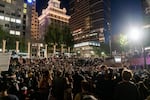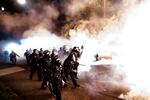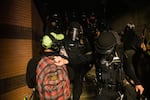The city of Portland pushed back against federal prosecutors overseeing the Department of Justice settlement agreement Friday, alleging the federal government itself is at least partially responsible for the more than 6,000 documented uses of force by Portland police officers in 2020.
In a letter responding to the Justice Department’s April 2 formal notification of noncompliance with the 2014 settlement, City Attorney Robert Taylor devotes the first page and a half to outlining a number of steps the city says it is taking to reform policing in Portland, and how the pandemic adversely impacted city functions last year.
Among the initiatives the city touted in its letter is Portland Street Response, a pilot program that provides a non-police response to 911 calls for people experiencing homelessness or in a mental health crisis in a small section of the city.
Mayor Ted Wheeler recently said he wants to slow the program’s rollout and withheld funding to take the program city-wide in his latest budget proposal.
Several pages in Portland’s letter are spent explaining how federal law enforcement officers reinvigorated the protest movement last summer.

Massive crowds gathered in Portland for a fourth evening of protests over the killing of George Floyd, a Black man from Minneapolis who was killed after an officer pushed his knee into his neck for nearly nine minutes on June 1, 2020. Unlike previous nights of protests, there was a limited police presence on Portland streets, and demonstrators remained peaceful throughout five hours of marching.
Jonathan Levinson / OPB
“The City hopes the DOJ understands that the conduct of the United States in Portland in 2020 made a difficult situation worse, inflamed the demonstrations, and contributed to the protracted and more intense protests in the City,” the letter reads. “As a result of the federal government’s conduct, the City was placed in a much more difficult position to meet its obligations under the settlement agreement.”
The letter argues that the Department of Homeland Security, like the Portland police, has so far failed to implement policy changes recommended by that agency’s inspector general and that DHS has been slow to complete its own after-action reports for protests.
The Justice Department civil rights division, the group overseeing the settlement agreement with Portland, has no involvement with the Department of Homeland Security.
Justice Department lawyers formally notified the city it was out of compliance on April 2, after sending a blistering assessment of bureau actions during its 2020 protest response. That letter detailed numerous failures to adhere to bureau use of force directives, and in one instance said bureau leadership exhibited a “fundamentally flawed understanding of the constitutional and policy standard for use of force.”
The city’s 40-page response goes step-by-step through a long list of areas where DOJ said the city failed to meet its requirements. City attorneys disagreed with a number of Justice Department claims and repeated its argument that no system could withstand the sheer volume of force incidents recorded in 2020.
“It is noteworthy the DOJ found substantial compliance for all uses of force during 2020 that were not associated with the crowd control events,” Taylor wrote in the letter. “This demonstrates that outside of the crowd control events, the structure in place pursuant to PPB directives on uses of force worked as intended. The failure occurred in the midst of the unprecedented ongoing crowd control situations”
Portland’s strategy is unlikely to placate federal prosecutors who have so far rebuffed any claim that extenuating circumstances in 2020 somehow relieve the city of its obligations under the Constitution or the settlement agreement.
“They say the demonstrations overwhelmed the system,” Jared Hager, one of the assistant U.S. attorneys overseeing the settlement agreement told OPB in March. “But it was PPB’s use of force, not the demonstrations, that revealed the city’s force reporting/reviewing systems and its accountability systems to be inadequate.”

Police use chemical irritants and crowd control munitions to disperse protesters during a demonstration in Portland, Ore., Saturday, Sept. 5, 2020. Hundreds of people gathered for rallies and marches against police violence and racial injustice Saturday night in Portland, Oregon, as often violent nightly demonstrations that have happened for 100 days since George Floyd was killed showed no signs of ceasing.
Noah Berger / AP
The city disputed the Justice Department’s position that Mayor Ted Wheeler’s press release restricting tear gas over the summer provided insufficient guidance to officers charged with carrying out the new policy. City officials also countered allegations that police relied too heavily on the long-range acoustic device, or LRAD, a loudspeaker system used during protests to make announcements to the crowd including use of force warnings.
“If a crowd member does not hear the sound truck, which is meant to carry a message over a large distance, then it is unclear how the DOJ expects a crowd member to hear the voice of a single officer wearing a face covering and in a loud protest event,” the city’s letter states.
At the core of the city’s noncompliance is what the DOJ says are cascading failures to abide by use of force policies and adequately document, review, and investigate uses of force. Poorly documented uses of force are impossible to properly investigate putting officer accountability out of reach, according to the Justice Department.
Federal prosecutors have been trying to get answers to questions about officers’ use of force since last June.
“We wanted to know specifically what daily information PPB executives were receiving and how they were using it to manage use of force,” Assistant U.S. Attorney Jonas Geissler and Hager wrote in a May 5 response to the Bureau’s 2020 civil unrest after-action review. “PPB did not produce — and apparently did not track — an inventory of munitions or a daily count of the type and amount of force used against individuals.”
After months of asking the city for its remediation plan to come back into compliance – and the city initially claiming they weren’t obligated to provide one – the DOJ got at least some answers.
To improve the quality of the use of force reports, the bureau said it will assign sergeants to crowd control events who will be responsible for interviewing officers and witnesses before the end of their shift.

A Portland police officer pushes a National Lawyers Guild legal observer. Protesters returned to the Justice Center on day 76 of protests against systemic racism and police violence.
Jonathan Levinson / OPB
The city agreed with Justice Department concerns that officers conflated active and passive aggression. In one use of force incident outlined by federal prosecutors, they said, “none of the facts presented meet the PPB policy definition of active aggression.”
In response, the city attorney’s office trained members of the police’s rapid response team and mobile field force, two groups responsible for the brunt of crowd control, on the relevant crowd control and use of force policies. That training will be provided bureau-wide starting this summer.
Portland hopes to allocate funds to buy Microsoft Office 365, a badly needed software upgrade that will significantly streamline processing and reviewing force reports, city officials wrote. The roughly $465,000 purchase will require City Council’s approval. The included SharePoint software will also make it easier to include video and photo evidence, as well as facilitate oversight by commanders.
But Geissler and Hager said training and software alone are unlikely to bring the city back into compliance, or the DOJ’s good graces.
“PPB focuses primarily on external factors beyond its control while over-relying on training and software to address the few faults it is willing to own,” the federal prosecutors wrote in their May 5 letter. “Consequently, PPB has not yet identified a satisfactory remedy to ensure full compliance with the Agreement’s force reporting and review requirements.”
If the federal government’s concerns aren’t resolved by the city’s letter, the next step is a face-to-face meeting and then the disagreement will go to mediation. If those efforts fail, the federal judge overseeing the 2014 settlement agreement could choose to force a remediation plan on the city.
